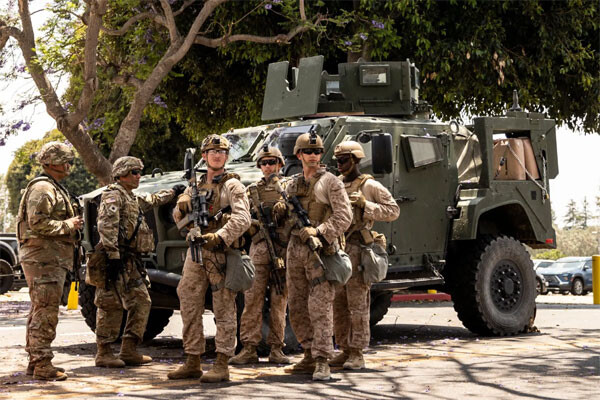
LOS ANGELES — A federal judge has ruled that the Trump administration illegally deployed U.S. military forces, including federalized California National Guard members and Marines, for domestic law enforcement activities in Los Angeles. The ruling, issued by U.S. District Judge Charles Breyer, concluded that the actions violated the Posse Comitatus Act, a 19th-century law that restricts the use of the military for civilian law enforcement purposes.
The decision is a significant legal blow to the administration, which had used the troops to assist federal agents during an aggressive immigration crackdown in the Los Angeles area. According to Judge Breyer's 52-page opinion, the military presence, dubbed Task Force 51, engaged in activities that "pervade the activities of those civilian agents." This included setting up protective perimeters, conducting traffic blockades, and assisting with crowd control. The judge stated that these actions went beyond the military’s legal scope and demonstrated a "top-down, systemic effort" to use armed forces to enforce federal law.
A Strong Warning and a Legal Precedent
In his ruling, Judge Breyer issued an injunction, blocking President Trump and Defense Secretary Pete Hegseth from using troops in California for a list of law enforcement actions, including arrests, searches, seizures, and patrols. The judge’s decision effectively serves as a warning shot to the administration, which has expressed intentions to deploy similar forces in other cities across the country, including in Illinois.
Governor Gavin Newsom of California, who filed the lawsuit in June, hailed the decision as a victory for state authority and accountability. "The people of California won much needed accountability against Trump’s ILLEGAL militarization of an American city!" his office wrote on X, formerly known as Twitter. Newsom initially sued after Trump federalized the state's National Guard members in the wake of immigration policy-related protests. While a federal appeals court had allowed the administration to maintain control of the troops, it hadn't addressed the core question of whether their actions violated the Posse Comitatus Act. Judge Breyer's ruling now definitively answers that question.
The Legal and Political Ramifications
The ruling, which the Trump administration has already announced it will appeal to the 9th U.S. Circuit Court of Appeals, has far-reaching implications. While the injunction is limited to California, legal experts say the decision will set an important precedent. Brenner Fissell, vice president of the National Institute for Military Justice, called the ruling the "most learning on this issue that we have had in decades." He added that other district court judges would likely refer to Breyer's opinion and would have to "explain why" if they chose to disagree with its findings.
The deployment of federal troops to American cities has been one of the most controversial moves of the Trump presidency. A July CNN poll found that 59% of Americans opposed the use of National Guard troops over the objections of state governors. The opposition was particularly strong among Democrats and Independents, while the majority of Republicans supported the president's actions.
The case highlights the ongoing tension between federal and state powers, particularly regarding the use of military forces on domestic soil. Judge Breyer's conclusion that the administration’s actions aimed to create a "national police force with the President as its chief" underscores the fundamental legal and constitutional principles at stake.
[Copyright (c) Global Economic Times. All Rights Reserved.]





























